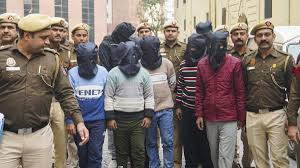In last 6 months, at least 770 from Delhi alone deported to Bangladesh as part of crackdown

Delhi authorities have intensified their efforts to tackle illegal immigration from Bangladesh. In the last six months, they deported more than 770 people. This crackdown reflects the government’s determination to identify and remove unauthorized foreign nationals living in the capital.
Background: Rising Concerns Over Illegal Immigration
Delhi attracts many migrants from neighboring countries seeking better opportunities. However, illegal immigration has created challenges, including pressure on resources and security issues. Reports show that many undocumented immigrants live in slums and work informal jobs. These trends pushed the government to take stronger action.
The Crackdown Begins: Targeted Raids and Arrests
Starting in late 2024, Delhi Police launched operations targeting suspected illegal immigrants. The raids covered areas like Alipur, Bawana, Narela, and northwest Delhi.
In May 2025, police detained over 121 suspected Bangladeshi nationals. Most lacked valid documents. Many had lived in India for years and worked as ragpickers, construction laborers, or domestic helpers.
The police also uncovered networks of Indian citizens who helped illegal immigrants. Some locals provided shelter or helped forge documents. Authorities arrested several of these facilitators.
Notable Arrests: Families Included
The crackdown caught entire families, including children. On May 23, 2025, police arrested a family of nine in Bharat Nagar, northwest Delhi. They had entered India illegally through the Cooch Behar border. The family lived without legal documents for years.
Such arrests raised humanitarian concerns. Social workers urged authorities to treat children and vulnerable people with care. Still, the government stressed that law enforcement must continue to protect national security.
Verification Drives: Checking Residents Thoroughly
Delhi Police launched large-scale verification drives in neighborhoods with many migrants. They screened over 5,000 individuals and examined their identity documents.
The drives identified 831 people living illegally, mostly Bangladeshi nationals. Many lacked valid visas or passports. Officials conducted these checks carefully to avoid wrongful arrests.
The verification efforts continue as part of the government’s commitment to curb illegal immigration.
Deportation Challenges: Verification and Diplomacy
Deportation faced hurdles due to slow verification by Bangladesh. India has a list of over 2,360 people awaiting deportation. Many have finished jail sentences in India for immigration violations.
India urged Bangladesh to speed up nationality verification. Delays caused overcrowded detention centers and prolonged uncertainty for detainees.
Diplomatic talks focus on improving cross-border enforcement and verification processes. India and Bangladesh share a long border prone to illegal crossings, making cooperation crucial.
Impact on Society and Communities
The crackdown has drawn mixed reactions. Some Delhi residents support it as necessary for law and order. They say illegal immigration worsens unemployment and strains public services.
Migrant advocates warn that many deportees are poor and desperate. They call for humane treatment, legal aid, and support programs. NGOs urge authorities to provide shelters and counseling to help deportees reintegrate.
National Security and Immigration Policy
Delhi’s actions reflect India’s broader policy to enforce immigration laws. The government aims to address security risks tied to illegal immigration. This includes concerns about terrorism and crime.
The crackdown aligns with efforts to update immigration records and improve agency coordination.
The Road Ahead
Deporting over 770 illegal immigrants in six months marks progress but only starts the long-term fight. Delhi must maintain vigilance and strengthen border management. Cooperation with Bangladesh remains vital.
A balanced immigration policy can help address the root causes of illegal migration. Issues like poverty and lack of opportunity in neighboring regions drive people to cross illegally.
Delhi’s crackdown offers lessons in managing migration challenges. It shows how governments must balance security, sovereignty, and human rights in today’s world.






